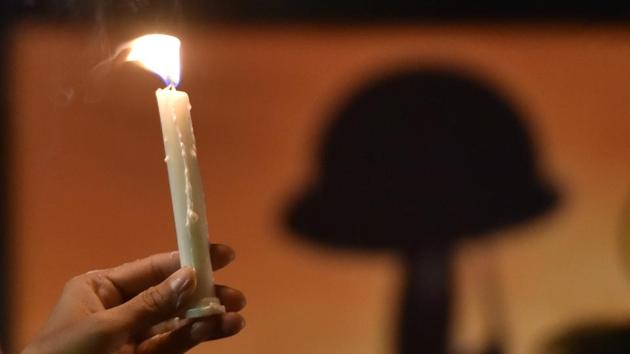After Pulwama, be tough with Pakistan. Be smart internally with Kashmir
To smear all Kashmiris - as the Meghalaya Governor has done without any public admonishment from the Modi government - is not just wrong; it only helps Pakistan.
Since the Pulwama terror attack, I have argued that this is an inflection point. We should get set for everything to change. I have expected dramatic shifts both in India’s internal policy in the Kashmir Valley and in its external response to Pakistan. A calibrated military response — whether in the form of escalated fire power at the Line of Control, covert action, or the use of air power — are all firmly on the table as options. An act of war by Pakistan’s Deep State, which Pulwama clearly is, certainly demands an appropriate hit back. This is not war-mongering; it is justice.

We need a more nuanced debate on our domestic Kashmir policy. Certain changes were overdue. The withdrawal of security cover to the separatists of the Hurriyat Conference is one such move. Over the years, there has been a befuddling monetary cultivation of secessionists by intelligence agencies. Former Research and Analysis Wing (R&AW) chief AS Dulat formally outed this when he argued that “corrupting someone with money is better than killing them”. His approach may have made sense in the years when the back channel was open and both militants and separatists were open to dialogue. Or because Pakistan-backed terrorists assassinated Abdul Gani Lone of the Hurriyat Conference and wiped out an entire faction of the Hizbul Mujahideen for daring to talk to Delhi.
Now the separatists have become unyielding and unwilling to participate in any sort of talks. So the context to provide them government security evaporates.
But should that logic apply to mainstream Kashmiri politicians or political workers who not just commit their allegiance to India, but risk their lives to take part in the electoral process? Shouldn’t this decision be based strictly on threat assessments? Aren’t we surrendering to the Pakistani script by treating all Kashmiris as the adversary?
We must understand that a significant shift has taken place in Kashmir since the 2016 elimination of Burhan Wani, who advocated for a caliphate in the Valley. Apart from Pakistan’s Great Game and a global pan-Islamist influence, a senior police officer identified two other reasons for the spike in local militancy: “Social media and response from the rest of India”. Social media has provided a perceived “glory factor” and an environment of competitive extremism has fomented the local turmoil. The ill-conceived alliance between the Bharatiya Janata Party (BJP) and the Peoples Democratic Party (PDP) only heightened “extremes”. Islamism and Hindutva have also fed off each other.
As separatists steadily become marginalised by terrorists, the challenge for the Kashmir police — the hardiest and bravest in the world — has been how to counter militant violence but contain civilian casualties. This was especially difficult after the emergence of the phenomenon of the “upper buddy”. This refers to men who were ready to join militant groups but did not possess weapons. Many of the encounters immediately after 2016 saw civilian attacks on guard posts for the looting of weapons, even during active encounters.
Kashmir’s top policeman, SP Pani, the youngest-ever to hold the post, quietly introduced small changes. Bodies of those killed in encounters were to be properly zipped in covers and not paraded. At post-mortems of killed terrorists, no photographs were to be taken or distributed. Sometimes, he personally attended to phone calls from angry relatives of militants demanding the body and surprised them with his controlled civility. Then he turned his attention to dismantling the Jaish-e-Mohammed (JeM).
Between 2016 and 2019, 90 JeM cadres were killed; 55 of these were in 2018 alone. At the same time, during 67 encounters with terror groups in 2018, the police brought the civilian casualties down significantly. Where previously civilians encircling encounter sites could lead to at least two civilians dying in every encounter with militants, the police managed to contain the number at 29 in 2018. This could explain why JeM was desperate to prove its presence in the Valley.
The police have now turned their attention to the state’s courts. After all Masood Azhar is free today because despite being in a Jammu prison for five years, we did not convict him. The state police have pushed back against routine paroles and granting of bail and the failure to convict a single significant terrorist. Recently, they fought to have bail cancelled to Asiya Andrabi of the Dukhtaran-e-Millat — a female separatist seen to have close links with both the Lashkar-e-taiba and the JeM.
These are the battles we must focus on internally. We should learn from the local police how to be hardy and compassionate at the same time. Or from the Central Reserve Police Force (CRPF), which, in its greatest moment of loss and mounrning, set up a Madadgar helpline for Kashmiri students.
To smear all Kashmiris —as the Meghalaya Governor has done without any public admonishment from the Modi government — is not just wrong; it only helps Pakistan.
Be tough with Islamabad and be smart and sensitive with Kashmiris.
Barkha Dutt is an award-winning journalist and author
The views expressed are personal






